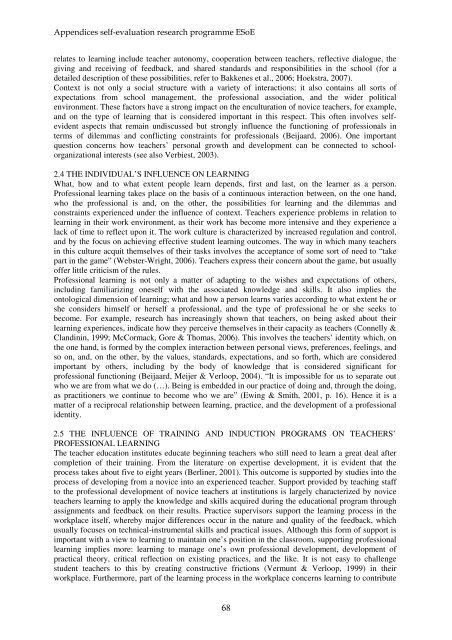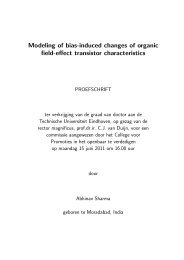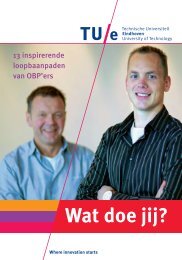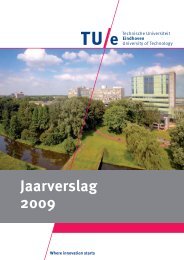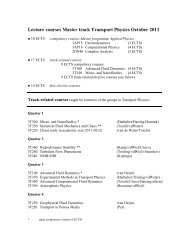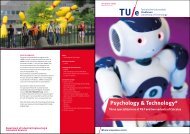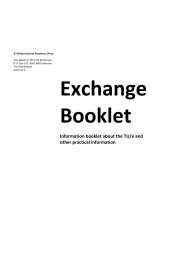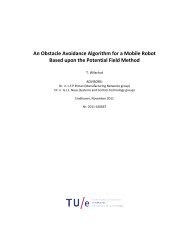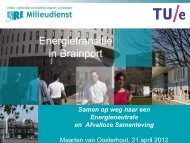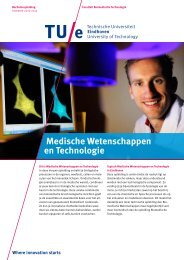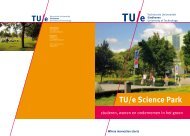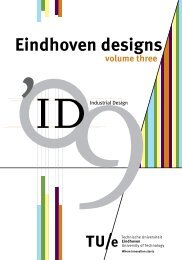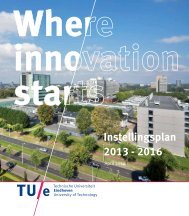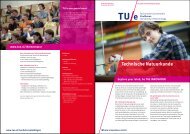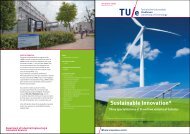Self-evaluation - Technische Universiteit Eindhoven
Self-evaluation - Technische Universiteit Eindhoven
Self-evaluation - Technische Universiteit Eindhoven
You also want an ePaper? Increase the reach of your titles
YUMPU automatically turns print PDFs into web optimized ePapers that Google loves.
Appendices self-<strong>evaluation</strong> research programme ESoE<br />
relates to learning include teacher autonomy, cooperation between teachers, reflective dialogue, the<br />
giving and receiving of feedback, and shared standards and responsibilities in the school (for a<br />
detailed description of these possibilities, refer to Bakkenes et al., 2006; Hoekstra, 2007).<br />
Context is not only a social structure with a variety of interactions; it also contains all sorts of<br />
expectations from school management, the professional association, and the wider political<br />
environment. These factors have a strong impact on the enculturation of novice teachers, for example,<br />
and on the type of learning that is considered important in this respect. This often involves selfevident<br />
aspects that remain undiscussed but strongly influence the functioning of professionals in<br />
terms of dilemmas and conflicting constraints for professionals (Beijaard, 2006). One important<br />
question concerns how teachers’ personal growth and development can be connected to schoolorganizational<br />
interests (see also Verbiest, 2003).<br />
2.4 THE INDIVIDUAL’S INFLUENCE ON LEARNING<br />
What, how and to what extent people learn depends, first and last, on the learner as a person.<br />
Professional learning takes place on the basis of a continuous interaction between, on the one hand,<br />
who the professional is and, on the other, the possibilities for learning and the dilemmas and<br />
constraints experienced under the influence of context. Teachers experience problems in relation to<br />
learning in their work environment, as their work has become more intensive and they experience a<br />
lack of time to reflect upon it. The work culture is characterized by increased regulation and control,<br />
and by the focus on achieving effective student learning outcomes. The way in which many teachers<br />
in this culture acquit themselves of their tasks involves the acceptance of some sort of need to “take<br />
part in the game” (Webster-Wright, 2006). Teachers express their concern about the game, but usually<br />
offer little criticism of the rules.<br />
Professional learning is not only a matter of adapting to the wishes and expectations of others,<br />
including familiarizing oneself with the associated knowledge and skills. It also implies the<br />
ontological dimension of learning; what and how a person learns varies according to what extent he or<br />
she considers himself or herself a professional, and the type of professional he or she seeks to<br />
become. For example, research has increasingly shown that teachers, on being asked about their<br />
learning experiences, indicate how they perceive themselves in their capacity as teachers (Connelly &<br />
Clandinin, 1999; McCormack, Gore & Thomas, 2006). This involves the teachers’ identity which, on<br />
the one hand, is formed by the complex interaction between personal views, preferences, feelings, and<br />
so on, and, on the other, by the values, standards, expectations, and so forth, which are considered<br />
important by others, including by the body of knowledge that is considered significant for<br />
professional functioning (Beijaard, Meijer & Verloop, 2004). “It is impossible for us to separate out<br />
who we are from what we do (…). Being is embedded in our practice of doing and, through the doing,<br />
as practitioners we continue to become who we are” (Ewing & Smith, 2001, p. 16). Hence it is a<br />
matter of a reciprocal relationship between learning, practice, and the development of a professional<br />
identity.<br />
2.5 THE INFLUENCE OF TRAINING AND INDUCTION PROGRAMS ON TEACHERS’<br />
PROFESSIONAL LEARNING<br />
The teacher education institutes educate beginning teachers who still need to learn a great deal after<br />
completion of their training. From the literature on expertise development, it is evident that the<br />
process takes about five to eight years (Berliner, 2001). This outcome is supported by studies into the<br />
process of developing from a novice into an experienced teacher. Support provided by teaching staff<br />
to the professional development of novice teachers at institutions is largely characterized by novice<br />
teachers learning to apply the knowledge and skills acquired during the educational program through<br />
assignments and feedback on their results. Practice supervisors support the learning process in the<br />
workplace itself, whereby major differences occur in the nature and quality of the feedback, which<br />
usually focuses on technical-instrumental skills and practical issues. Although this form of support is<br />
important with a view to learning to maintain one’s position in the classroom, supporting professional<br />
learning implies more: learning to manage one’s own professional development, development of<br />
practical theory, critical reflection on existing practices, and the like. It is not easy to challenge<br />
student teachers to this by creating constructive frictions (Vermunt & Verloop, 1999) in their<br />
workplace. Furthermore, part of the learning process in the workplace concerns learning to contribute<br />
68


